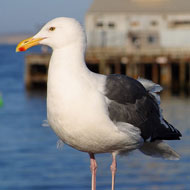
Urban seagulls accused of terrorising towns and cities
A quarter of a million pounds has been set aside by the government to tackle urban seagulls - accused of being a menace to society due to their aggressive, food-stealing ways.
George Osbourne set aside the funding in the 2015 pre-election budget, which was published last week.
It will be used for research on the birds' aggressive behaviour in British towns and cities, informing authorities on the best way to control urban populations.
It is thought there are more than 250,000 breeding pairs of the most common seagull species, according to a report by Defra's chief scientist.
Prime Minister David Cameron told Western Morning News: "In my distant past I remember some seagulls taking the ham out of a sandwich. But I haven't held that against the entire seagull population since."
The news has been welcomed by campaigners including Don Foster MP, who hosted a "seagull summit" in 2012.
"For several years people in Bath have been contacting me about this issue and asking for action. Urban gulls cause mess, noise and damage to property, and are very aggressive in the nesting season.
"There is not enough data to enable a strategic approach to the problem, and I have long been pressing for funding to be given so that progress can be made."
Image © Jon Sullivan/public-domain-image



 The veterinary mental health charity Vetlife is inviting the veterinary community to join it for a sponsored cold-water dip.
The veterinary mental health charity Vetlife is inviting the veterinary community to join it for a sponsored cold-water dip.